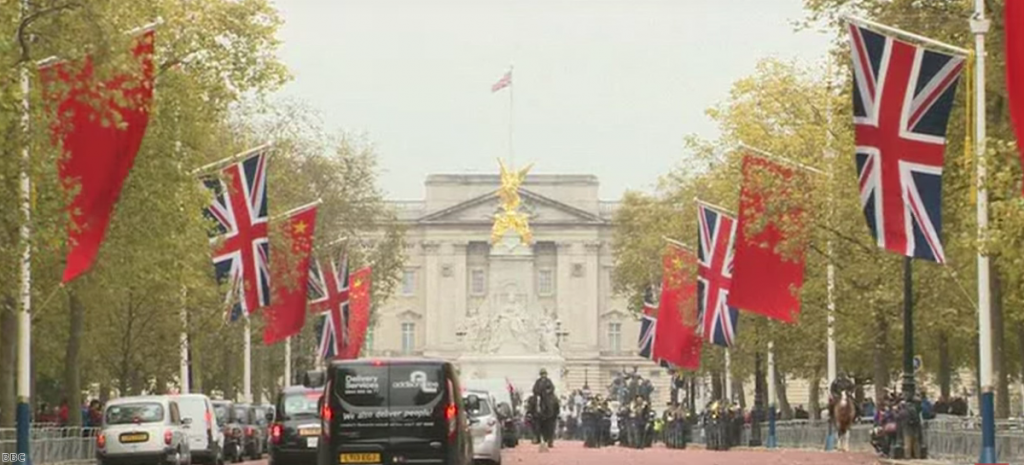David Cameron’s comments on Chinese human rights should be made public
By Paul Afshar
It’s been ten years since a Chinese president visited the UK. The last time was in 2005 when Hu Jintao received a noisy reception at Buckingham Palace. Like the protestors outside not everyone in the Royal Family was receptive to his stay with Prince Charles, a long-time supporter of the Dalai Lama, omitting to attend a state banquet in his honour. Last night he stayed away again.
A lot has happened in those ten years. There have been high profile cases like that of Chen GuangCheng, the "barefoot" and blind human rights lawyer, who escaped house arrest and was eventually allowed by the Chinese government to claim a new home in the US. Or the dissident artist Ai WeiWei who was arrested for revealing the names of students who perished in the Sichuan earthquake of 2008. He says he was beaten, imprisoned, and then released. In 2011 he was again arrested, along with his 2year-old son, Ai Lao, for speaking out against the regime.
I had the honour of meeting Ai WeiWei several times during a three year stint in China. His commitment and resolve in the face of physical punishment was, and remains inspiring.
One thing that struck me about WeiWei was his ability to tell the human story and shine a light on individual characters abused by the Chinese state.
There are many cases like those of Ai and Chen. Yet, to paraphrase a perhaps sinister observation: one is a tragedy, thousands, unfortunately, become statistics.
Dissident Chinese lawyer Chen Guangcheng & his wife ask our leaders not to put business before human rights pic.twitter.com/jIguinj96u
— Amnesty UK (@AmnestyUK) October 20, 2015
But, it’s worth reflecting on those statistics. Here's just a few:
According to Human Rights Watch, some 160,000 people remained, at the beginning of last year, in unmarked labour camps across China.
Pressure group China Political Prison Concern has started to investigate and profile the individuals detained for ‘crimes of conscience’. They’re currently at number 293.
Since July 9 this year Chinese authorities have detained or questioned over 250 human rights lawyers – a move described as "unprecedented in scale" by NGO Human Rights in China.
The US Congressional-Executive Commission in China has itinerated some 7,738 cases of political or religious imprisonment in the country. This time last year 1,275 had still not been freed, including Liu Xiaobo, a Nobel Peace Prize winner, who continues to languish in Jinzhou prison.
These are statistics of men and women with names unrecognisable to many of us in the UK. So let us focus instead on one tragedy: that of a child named Bao.
In July, Bao ZhuoXuan and his father went to Beijing airport to board a flight for Australia where he was to attend middle school.Plain-clothes security agents reportedly dragged them from the security line and threw them into separate vans. Last week, Bao was snatched by uniformed men at a Myanmar border town as he tried to escape to the United States. He was then taken to his grandparent's home in northern China and police forbade him to leave.
Bao is 16. His only crime is the relation to his mother Wang Yu, a legal representative of Chinese feminists, who along with more than 200 lawyers is currently under state detention.
He is, tragically, the victim of a growing proclivity of the Chinese government to use children of rights lawyers and activists as hostages to press their parents.
Liu XiaoMing, the Chinese Ambassador to the UK, suggested last week that China would be "offended" if the issue of human rights abuses was raised during President Xi JinPing’s state visit. Saying: "He’s not here for a debate about human rights."
Xi JinPing's visit to Britain has been heralded as an opportunity to build closer economic and trade relationships with our country. I understand why he might not want to discuss human rights but the simple response to this, I believe, lies in a Chinese proverb: "unless we change direction, we are likely to wind up where we are headed."
For too long when British politicians have wined and dined Chinese officials they vaguely suggest that human rights were discussed. If our prime minister is sincere about these issues, he should prove it. His questions on human rights abuses, and President Xi’s response should be published verbatim.
When David Cameron sips tea with the Chinese president he has one chance to press for the release of 16-year-old Bao ZhuoXuan, he mustn't waste it.
Paul Afshar spent three years in China. He now campaigns for human rights in the country, and is based in London.You can follow him on Twitter here.
The opinions in Politics.co.uk's Comment and Analysis section are those of the author and are no reflection of the views of the website or its owners.





-01.png)